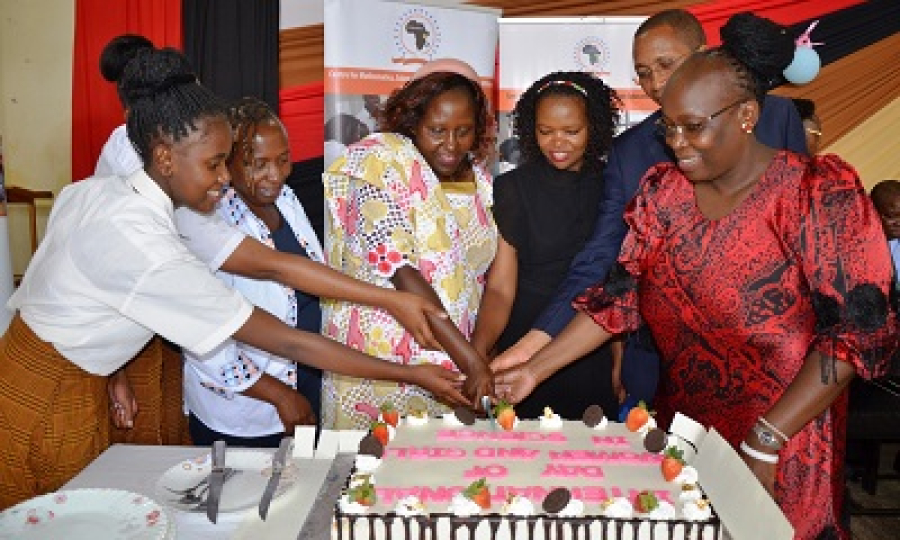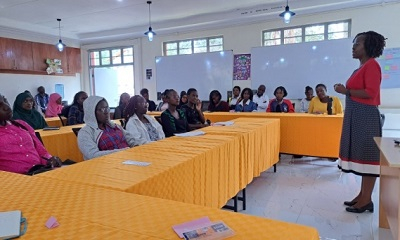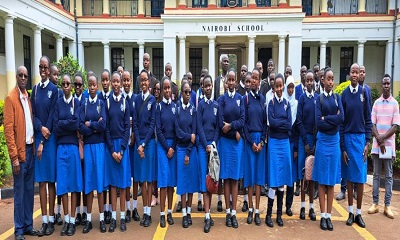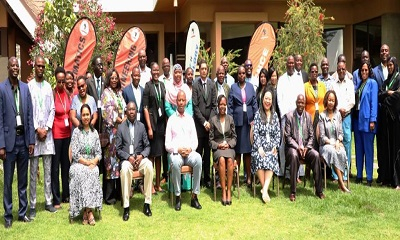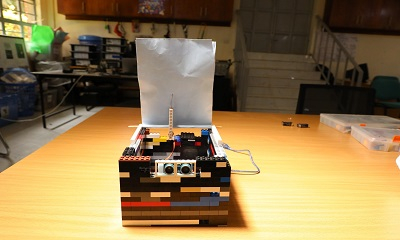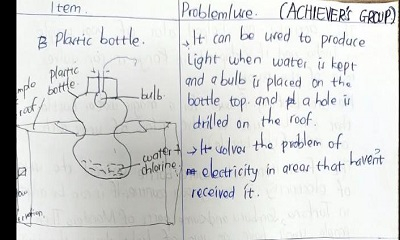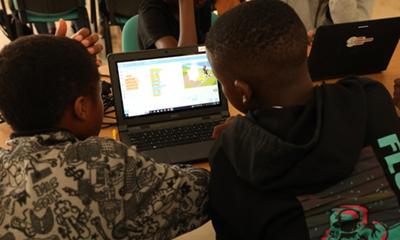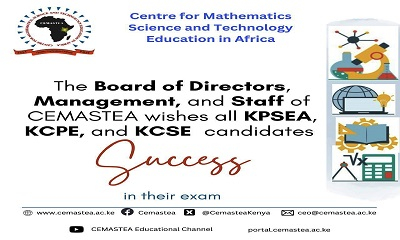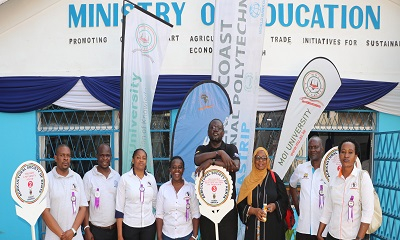CEMASTEA News 162
Children categories
By Ann Mumbi
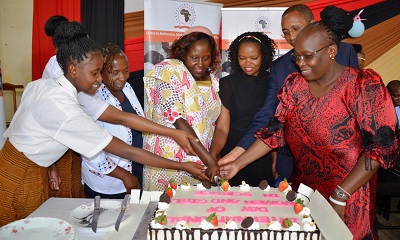
Girls are encouraged to take science and mathematics subjects to tap into huge career opportunities in the future.
Speaking during the International celebrations of the International Day of Women and Girls in Science hosted at Tumutumu Girls on Sunday, 11th February 2024, CEMASTEA together with Women in the STEM field appealed to players in the education sector and women in STEM to mentor girls.
Kenya Urban Roads Authority(KURA) Director of planning and development, Eng Jacinta Mwangi said that many girls in Kenya are steering clear of the science careers due to lack of continuous mentorship and lack of support from their parents to pursue sciences. According to her “Many girls are still not getting into these spaces so there is a need for continuous mentorship about the importance of mathematics and science. Even as we are talking to these girls it is also important for parents to be reminded that STEM courses are not a preserve of men,” Eng Jacinta said.
Regional Manager of Zizi Afrique Foundation Dr. Purity Ngina, said that according to the statistics, a lot of careers in the 21st century are in Sciences. “Our projections as a country is that 60 per cent of our workforce will be in STEM and that is why the government is guiding us towards STEM courses and it will be wrong for girls to be left behind,” Dr Ngina said. She urged girls to take up science and mathematics-related careers adding that science subjects will allow them to fit into the competitive job market. “Skills in STEM will play an important role in the jobs of the future. We need to invest this opportunity to ensure young women have the right skills for these jobs,” she noted.
CEMASTEA CEO, Madam Jacinta L. Akatsa, represented by Madam Beatrice Macharia who coordinates the Special Programme and Student learning at CEMASTEA encouraged more girls to pursue science and mathematics subjects. ‘CEMASTEA’, she said, has a mission to promote STEM education and to promote gender equality in STEM education. In order to achieve this, the Centre has put in place a variety of strategies. Some of the strategies include the STEM outreach programmes in schools and school visits to the Centre.

Learners at Tumu Tumu girls following the discussions

Learners displaying a customised poster during the international day for women and girls in science
Ivy Waithera a form four student at the school said that she had picked three sciences Chemistry, as she wants to take a course in Biotechnology. “I urge my fellow girl to embrace STEM subjects as they have numerous job opportunities to fill the gaps of engineers,” the student added
February 11, International Day of Women and Girls in Science is an annual observance that celebrates the achievements and contributions of women and girls in the fields of Science, Technology, Engineering, and Mathematics (STEM). This is a day dedicated to promoting gender equality in STEM fields and encouraging more women and girls to pursue careers in science and technology and to break historical barriers and stereotypes in the field.
Read other published articles on the same:
- https://www.kenyanews.go.ke/embrace-science-related-careers-girls-urged/#:~:text=Women%20working%20in%20the%20field,into%20the%20competitive%20job%20market
- https://nairobireview.africa/girls-urged-take-science-mathematics-related-careers/
- https://teachersupdates.net/girls-urged-to-embrace-science-related-careers/
By Thuo Karanja, Patrick Wanjohi and Winfred Magu
CEMASTEA is a renowned institution dedicated to enhancing the quality of mathematics and science education by providing training, resources, and support to learners, STEM teachers and educators. The overarching focus is improving teaching and teaching methodologies and promoting STEM education. On 27th October 2023, the Centre was honoured to host a delegation of students from Kenyatta University Female Students in Science and Technology Club (KUFESST). The club is composed of girls taking STEM-related courses at Kenyatta University. The team of 27 girls visited the Centre to explore collaborative opportunities and exchange knowledge between the university and CEMASTEA in STEM education, outreach and research.
The visit commenced with a presentation by CEMASTEA, providing an overview of their programs, achievements, and on going activities. To better understand CEMASTEA's programs, best practices and initiatives in STEM education, the students were taken through a hands-on tour of CEMASTEA facilities. They visited the STEM labs, maker spaces and innovation room, where they interacted with teaching and laboratory scientists, performed mathematics and science activities and got a feel of what goes on at CEMASTEA, particularly the learner-centred programmes aimed at making STEM learning engaging and fun.
There was a session on reflection and networking that allowed the delegation to connect with CEMASTEA staff, fostering relationships for future collaboration. At this point, the CEMASTEA’s CEO, Mrs Jacinta Akatsa, a STEMIST in her own right, being a long-serving biology teacher and published author, gave the ladies an inspiring talk on STEM. She recalled her journey as a student, the gender obstacles she faced, and what good teaching in science and mathematics did to orient her future to what she is today. The delegation tour was organised and coordinated by KUFESST president and vice, Faith Wairimu and Joyce Ochieng, respectively KUFESST President Ms Wairimugave a powerful expose of what the club does, their outreach programmes and their aspirations. She also pointed out possible areas of mutual interest for joint projects and initiatives in which the two institutions could collaborate.
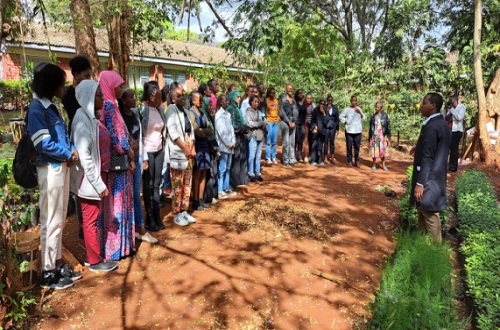
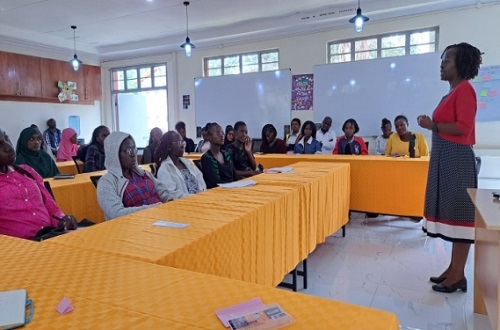
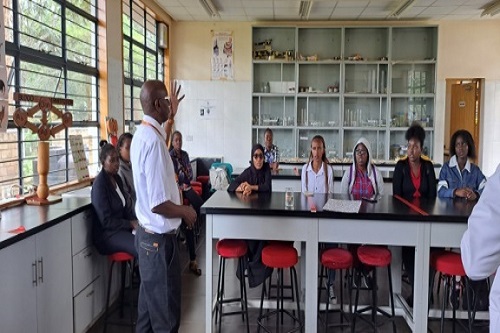
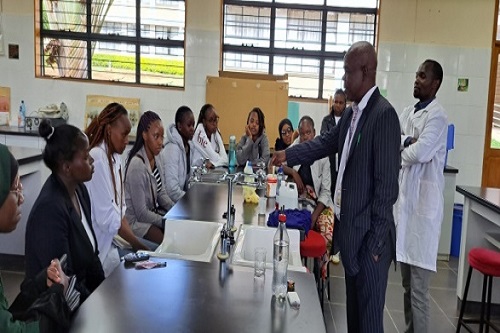
KUFESST delegates from Kenyatta University touring CEMASTEA facilities and listening to remarks by the CEO Madam Jacinta Akatsa.
At the end of the visit, when they visited the Centre's tree nursery, the girls had a short tour and talked about education for sustainable development. Mr Patrick Wanjohi and his team delivered the talk on the effects of climate change and good tree-growing practices. Each girl was given a tree as a sign of climate action and a commitment to protect the world from adverse climate change.
In their feedback on the visit's conclusion, the girls cited it as informative and productive, providing valuable insights into innovative mathematics and science education approaches. They looked forward to furthering our collaboration and contributing to advancing STEM education. There was a need to explore further areas for collaborative research in STEM and motivational outreach tours to students in secondary schools.
By Martin Mungai
The Kenya Mathematical Olympiad (KMO) 2023, organized jointly by CEMASTEA, the University of Nairobi (UON), and the Centre for Mathematics and Computing (CEMC) from the University of Waterloo, marked a significant milestone in promoting mathematical excellence among Kenyan secondary school students. The competition aimed to identify and nurture mathematical talents, providing a platform for students to showcase their skills and passion for mathematics. The foundation for KMO 2023 was laid with a comprehensive virtual training program for teachers in March 2023 that focused on problem-solving methodologies and building teacher capacity for setting problem-solving questions. A team of mathematics experts from the University of Waterloo, including Prof. Ian Vanderburg and Hon. Wesley Korir, the Director and Strategic Advisor on Africa Initiative to the Director of CEMC, led the training.
Mrs. Jacinta Akatsa, CEO CEMASTEA, led the organizing team for KMO in Kenya 2023; Prof. Stephen Luketero and Dr James Katende from UON; Martin Mungai, the coordinator of the organizing team; Nancy Nui, dean Mathematics at CEMASTEA; and Mrs Beatrice Macharia, the coordinator of the special programs and student learning and Mary Sichangi Coordinator of Partnerships and Linkages at CEMASTEA. The Olympiad run in three rounds, which resulted in the continuous elimination of learners. The process involved learners doing a test that was collaboratively prepared by collaboratively prepared by CEMC, UON, and CEMASTEA. About 8000 learners participated in the first round, out of which 762 high-performing students emerged, earning their spots in Round II.
While teachers were in charge of round one, CEMASTEA and UON staff administered and supervised round two. This further narrowed the pool from 762 students to 64, who once again demonstrated exceptional aptitude. They were selected to progress to Round III. Round III was conducted in 22 centres, with students virtually monitored as they tackled the challenging test. CEMASTEA oversaw the meticulous marking process, resulting in the identification of 24 students who exhibited exemplary performance. These students were then invited to the CEMASTEA campus for an intensive residential training program.
Global Appeal and the Road Ahead
From the residential training, six outstanding students were selected to represent Kenya at the International Mathematical Olympiad (IMO) held at the University of Bath in the UK in June. Six other students were also chosen to participate in the Pan African Mathematical Olympiad (PAMO) in South Africa. In comparison, 12 students earned the opportunity to represent the country at the East African Mathematical Olympiad (EAMO) later in the year. The success of KMO 2023 showcased the dedication of students, educators, and organizers to elevate the standards of mathematical education in Kenya. As the echoes of this achievement reverberate, KMO 2024 is already underway, with participants displaying a heightened enthusiasm to test their mettle and contribute to the legacy of mathematical excellence in the nation. The Kenya Mathematical Olympiad continues to inspire aspiring mathematicians, fostering a love for the subject and shaping the future of mathematical education in the country
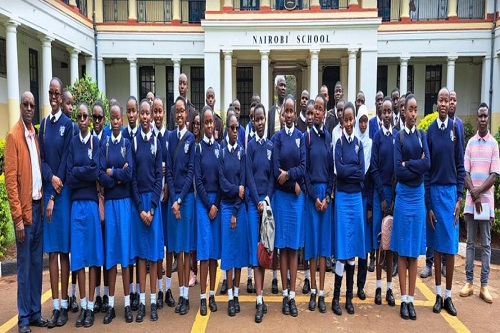
Students from Pangani Girls, Nairobi during the Kenya mathematics Olympiad competition at Nairobi School
By Mary Sichangi and Ann Mumbi
The Association for the Development of Education in Africa (ADEA) seeks to empower African countries to develop responsive education systems for sustainable development. ADEA achieves these aspirations through thematic-based Inter-Country Quality Nodes (ICQNs) such as the one on Mathematics and Science Education, (ICQN-MSE), a policy dialogue forum for ministers of education that implements programs focused on developing STEM education in African countries.
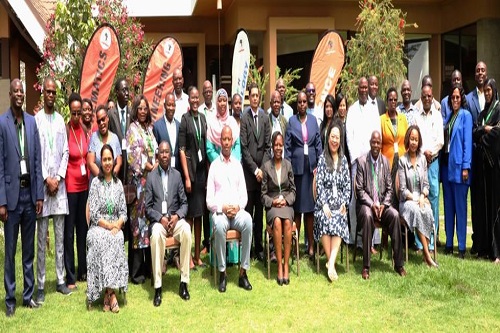
Seated from Right to left: Ms Ngina Kairu, Member, CEMASTEA Board of Governors, Mr. Charles Chacha Mwita, Director Policy, Partnership and East Africa Cooperation Affairs, MOE – Kenya; Ms. Cecilia Ochoa, Representative of LEGO Foundation; Mrs. Jacinta L. Akatsa CEO, CEMASTEA; Mr. Albert Nsengiyumva, CEO - ADEA; Dr Pius Mutisya, OGW, Chair, CEMASTEA Board of Governors and Shalini Mahadowa-Reechaye, Mauritius
The Centre for Mathematics, Science and Technology Education in Africa (CEMASTEA), on behalf of the Ministry of Education [MoE], Kenya, hosts the Secretariat of the Association for Development of Education in Africa’s Inter–Country Quality Node on Mathematics and Science Education (ADEA-ICQN-MSE) since 2014. The Centre in collaboration with ADEA, hosted an international workshop on the status of STEM education in Africa from 18th to 21st September, 2023. The meeting was aimed at harmonising understanding of the status of STEM education in Africa at basic learning based on findings from two studies conducted in primary (2022) and secondary (2020) levels; discuss the proposed Strategic Framework for ADEA’s Inter-Country
Workshop participants included senior ministry of education officials from the headquarters, regions, heads of primary or secondary schools, teacher trainers, teachers of STEM subjects, national curriculum development officers, national examination officers, commissions for science and technology, and quality assurance officers. The delegates were drawn from 17 countries that participated in the two studies. The Secondary study was represented by Botswana, Rwanda, South Africa, Ghana, Kenya, Namibia, Uganda, Angola and Morocco and the Primary study was by Eswatini, Nigeria, Ivory Coast, The Gambia, Kenya, Mauritius, Mozambique, Senegal, Malawi and Rwanda. Other guests included The ADEA Secretariat based in Ivory Coast and The LEGO Foundation.
The opening ceremony was graced by the Principal Secretary (PS), State Department for Basic Education Dr. Belio Kipsang, represented by the CEO-CEMASTEA, Mrs. Jacinta Akatsa. The PS pointed out that it was important to understand the current status of STEM education in Africa. Highlighting the critical role of a robust STEM education curriculum, Dr. Kipsang emphasised the need for investment in building STEM institutions. He informed participants that the Ministry of Education had taken various measures to promote STEM education, including capacity-building programs and the transformation of select secondary schools to model STEM education.
The Chief Guest further emphasised that the action points generated in this workshop had the potential to contribute to the Sustainable Development Goals (SDGs), the Continental Education Strategy for Africa (CESA) 16-25, and the objectives of STEM education. The workshop outcomes will drive substantial progress in STEM education across the continent by aligning regional strategies and fostering increased collaboration.
By Makoba Kizito, Lucy Mwaniki and Rodney Ndemo
CEMASTEA has established a Makerspace to promote innovation and creativity among students, allowing them to work on projects and solve real-life challenges. The space hosts schools from various educational levels, including high schools, junior secondary schools, and primary schools. Students are drawn to technology and robotics, demonstrating a love for STEM through practical application. The space offers hands-on activities using tools and applications such as Scratch, Lego Ev3 robot, MakeyMakey, and Arduino. This allows learners to explore computational design thinking concepts and brainstorm projects to grow and promote imagination, creativity, innovation, and problem-solving among learners. Some projects created in the maker spaces using Arduino Mega are described below.
Smart dustbin
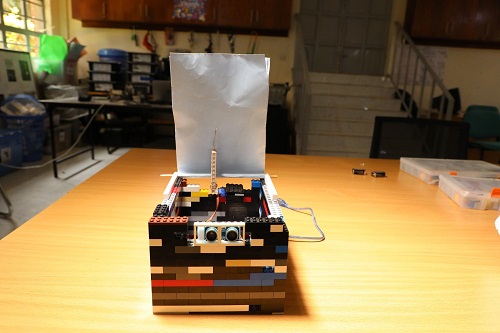
A Lego dustbin with an ultrasonic sensor detects objects less than 10 cm away, prompting the servo motor to open the lid.
Smart calculator
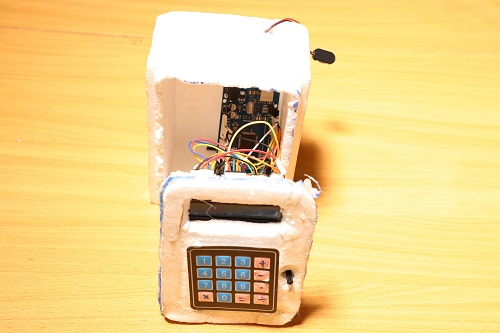
This calculator showcases keypad programming and uses a Styrofoam LCD screen powered by a 9V battery to perform arithmetic and geometric equations.
Smart home security system
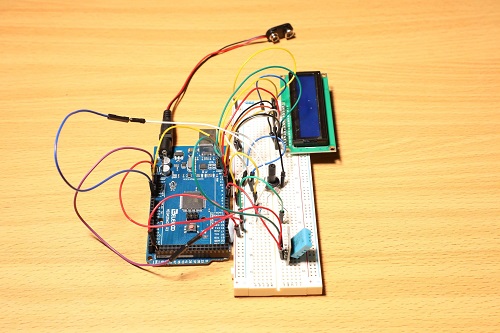
The project used RFID (Radio Frequency Identification) technology to lock and unlock a door using a reader and servo motor, a cardboard box casing, and card input.
Going forward, these experiences could lead to collaborations with other organisations in the STEM space and introduce the concept of developing projects using tools and applications such as Arduino. Teachers and school leaders will be sensitised to sustain these makers’ spaces and related activities.
By Kizito Makoba
The youth is brimming with original ideas, waiting for a tiny spark to kindle them. While raising awareness of the significance of maker spaces in schools, CEMASTEA’s engagement with students from STEM model schools around the country proved that this assertion was accurate. Regarding STEM pedagogies, Education for Sustainable Development (ESD), the creation of maker spaces, and their integration into the teaching-learning process, the Centre has been offering training to teachers and school leadership in STEM model schools. These trainings aimed to create interest in STEM subjects by popularising maker spaces as learning resources to enable learners to develop their creativity, critical thinking and problem-solving skills.
A strategy used to popularise the purposes of a maker space was one whereby teachers and learners engaged in a quick 10-minute STEM challenge ‘Magic Plastic Bottle’. The challenge involved developing as many useful products as possible from a used plastic water bottle. Another requirement for the challenge was that it had to be completed outside, preferably in some shade or under a tree. The usage of the outdoors was intended to demonstrate the versatility of maker spaces. Seeing the innovative products the teams created in under 10 minutes was incredible.
The above ideas are evidence of students’ innovativeness when given guidance through challenges. Schools can foster children's creativity by setting up maker spaces and regularly posing targeted problems for the students to develop solutions. The Sustainable Development Goals (SDGs) are a suitable starting point for framing the maker space challenges. For instance, SDG No. 6 for clean water and sanitation proposes measures to provide access to clean water and enhanced hygienic conditions. The challenge under this SDG can be to create a project that improves access to clean water and a hygienic environment. The challenges should be open to all students in the school, not only to STEM clubs or a particular group of students. We will likely notice an improvement in the student projects during the Kenya Science Engineering Fairs (KSEF) and other events where students display innovations.
The SCAMPER thinking tool was also introduced to assist pupils while they work on their creations. Substitute, Combine, Adapt, Modify (Magnify, Minify), Put to another use, Eliminate, Reverse (Rearrange) is an abbreviation for the SCAMPER. The fundamental idea behind most of our advancements is SCAMPER. The development of the mobile phone serves as a better example of this. The modern smartphone, with modifications, combines a variety of applications into a single unit. SCAMPER also emphasised how innovations are made possible by carefully studying and evaluating current technologies and formulating ideas for enhancing or improving them. Along with SCAMPER, another element that innovators research and draw inspiration from is the mother NATURE through biomimicry or copying nature to come up with solutions.
The combination of SCAMPER and biomimicry would assist teachers in giving students challenges to sharpen their problem-solving and critical-thinking abilities. Students might be challenged to alter a tool or equipment they use every day, for instance, so that it can do a different task or serve a different purpose. Students could also be given a creature, such as a praying mantis, and asked to explore its behaviour and structure concerning bionics. They are then challenged to create something based on specific traits or attributes of the mantis to address a real-life problem. These events should take place in the maker space.
A simple method to start a maker space is by filling it up with reusable items you use every day, such as cardboard boxes, cello tape, strings, cables, cutting tools, and Styrofoam, among others. Keep adding more supplies following the demands of the student's projects. Therefore, let's encourage innovation in our students by providing maker spaces in our schools. By becoming problem solvers or solution providers, students will be prepared for the rapidly changing world.
#Coding4Life
Digital literacy is one of the core competencies in Competency Based Curriculum. The Centre for Mathematics, Science and Technology Education in Africa (CEMASTEA) promotes attainment of digital literacy by organising STEM boot camps during school holidays. CEMASTEA will host the two boot camps from 20-24 November and 27th -1st December 2023.
The 4th STEM Boot Camp Cohort One running from November 20-24th, 2023 themed: "Igniting the Future: Inspire, Imagine, and Innovate" has kicked off.
The opening ceremony of Cohort 1 was graced by Chief Executive Officer, CEMASTEA, Mrs. Jacinta Akatsa represented by Deputy Director CEMASTEA Mrs. Lydia Muriithi. In her remarks, the CEO underlined the importance of training young people for the opportunities and challenges of the 21st Century. She cited that the boot camp would provide participants with the skills they needed for effective collaborative, critical thinking, problem solving, in a rapidly changing world.
In attendance was Hon. Wesley Korir, Advisor to the Director on Africa Initiatives - for CEMC - University of Waterloo in Canada encouraged the participants to uptake STEM subjects seriously to become problem solvers. He emphasised that boot camps of this nature provide a conducive environment to nurture resilience, problem solving and self-efficacy. These are skills that are essential for Africa's development.
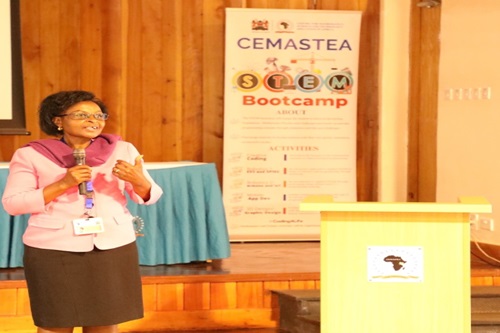
Mrs. Lydia Muriithi, Deputy Director, CEMASTEA speaking to the participants during the opening ceremony of the CEMASTEA STEM Boot camp
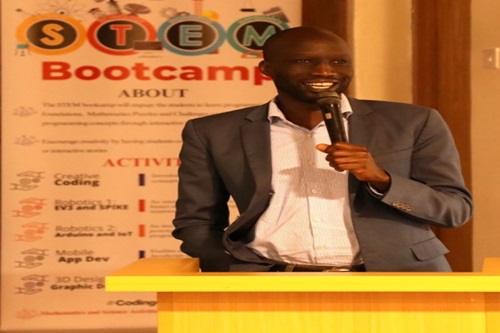
Hon. Wesley Korir - Advisor to the Director on Africa Initiatives - for CEMC - University of Waterloo in Canada addressing the participants during the opening ceremony
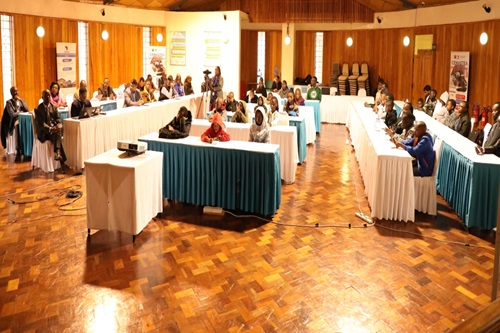
Participants listening to the opening ceremony
The participants will develop skills in Creative Coding, Robotics 1 & 2, Mobile app Development, Graphic Design/3D, Mathematics and Science Innovations. These experiences will spark an interest for the participants to pursue STEM related careers at the tertiary level, enhance students' creativity & innovation and promote a community of problem solvers and critical thinkers.
The boot camp has attracted participants ranging from Grade 3 to high school learners.
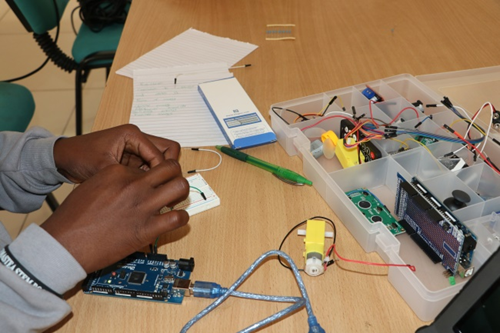
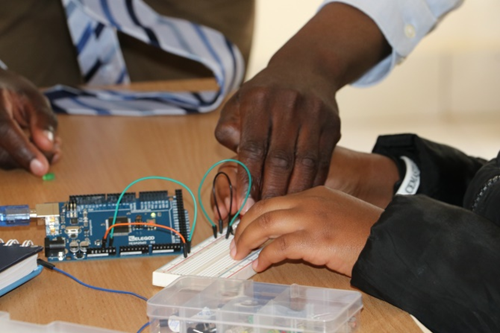
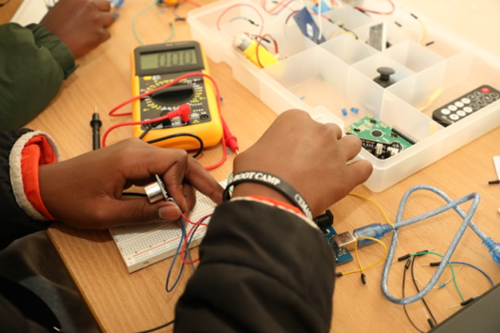
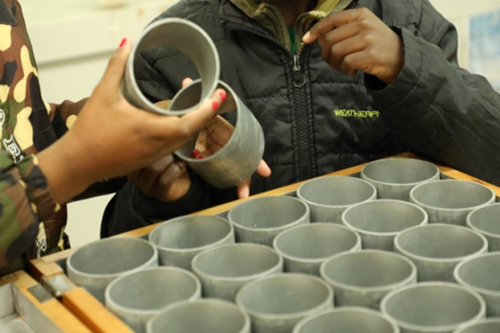
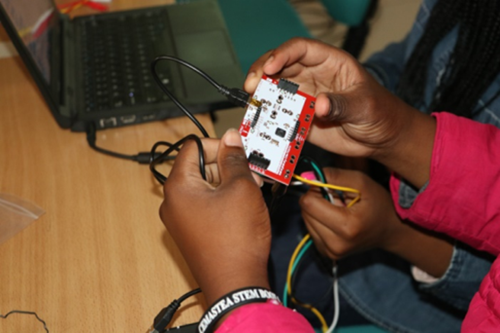
Participants involved in some of the activities in the boot camp
The CEMASTEA STEM boot camp is in collaboration with STEM Impact Centre, UCMAS, I-Start and STEAM Interactive.
The Board of Directors, Management, and Staff of CEMASTEA wishes all Kenya Primary School Education Assessment (KPSEA), Kenya Certificate of Primary Education (KCPE) and Kenya Certificate of Secondary Education (KCSE) candidates success in their examinations.
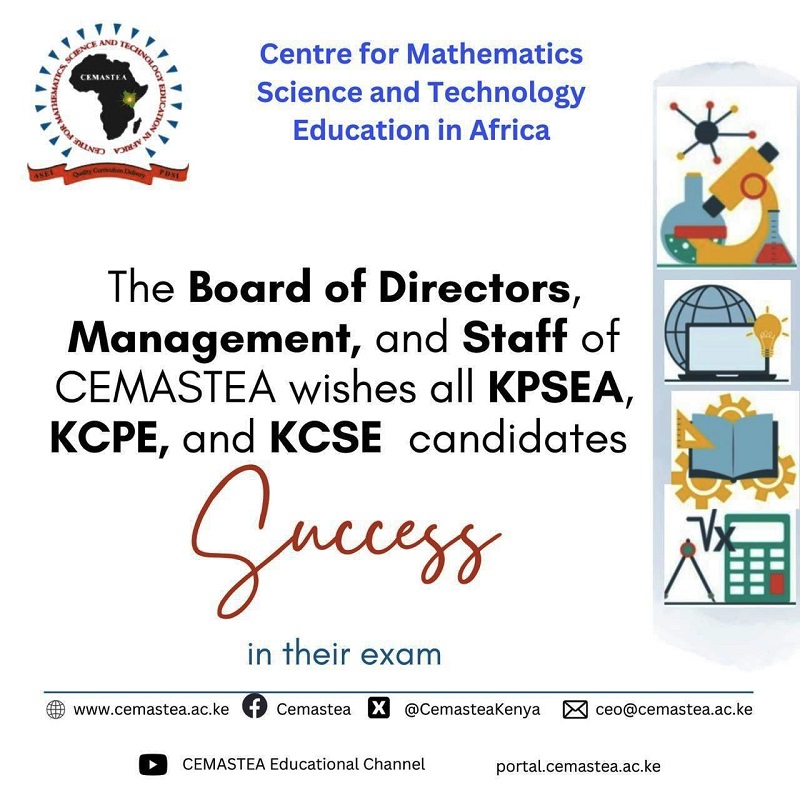
By Makoba Kizito and Winfred Magu
In promoting the spirit of delivering as one, the Ministry of Education (MoE) brought together its affiliated agencies and institutions to exhibit under its stand namely; CEMASTEA, Commission for University Education, Jaramogi Oginga University of Science and Technology, Kenya Coast National Polytechnic, Kwale Teachers Training College, KNATCOM -UNESCO, Moi University and Open University of Kenya. Themed “ Promoting Climate Smart Agriculture and Trade Initiatives for Sustainable Economic Growth’.
The fair provided an excellent opportunity for CEMASTEA to showcase its activities and programmes to the public.
During the event, CEMASTEA engaged members of the public in activities that promoted critical thinking while having fun. This approach was an excellent way to raise awareness about the programmes and activities that the centre offers. By encouraging critical thinking through game based activities, CEMASTEA is instilling a desire for learning in STEM.
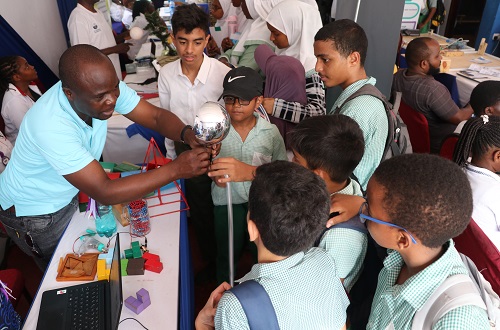
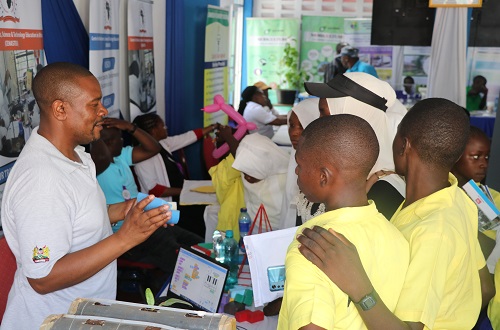
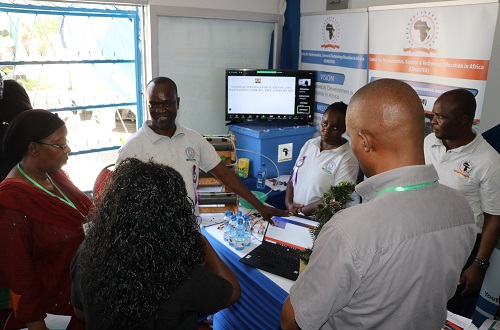
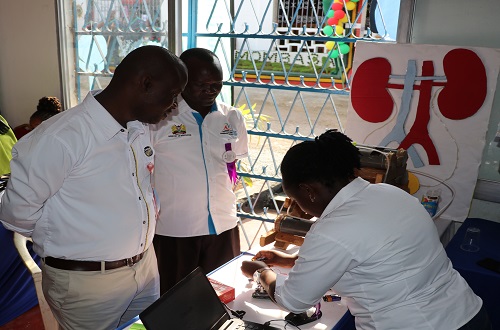
Visitors being taken through some of the teaching and learning resources displayed during the Fair by CEMASTEA Staff
The Ministry of Education won the following awards:
- 2nd position - Best University Stand
- 2nd position - The Stand that best interprets the current show theme education and/or research
- 3rd position - The Stand that best interprets the current show theme education and/or research
CEMASTEA staff poses with the various awards the MoE stand won during the Mombasa International Trade Fair
The awards were a testament to the dedication and hard work that the team had put in to ensure the stand was informative and interactive.
The show took place from 4-10 September, 2023.



